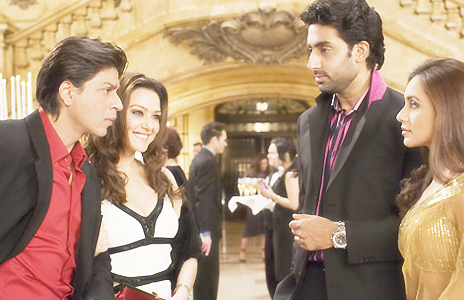It’s ironic that someone who champions brevity as I often do would love Bollywood so much. I find that most stories can be told properly in 90 minutes, so why don’t I mind a 3h15 monster like this? Well, for one thing, a good deal of that gargantuan running time is devoted to the spectacular musical numbers. Take these out and you’d effectively save almost an hour – but why would you want to do that? Similarly, these movies wouldn’t be so long if they didn’t pile up so many characters, complicated relationships and unexpected twists, but losing those would irremediably gut what makes them so wonderfully unique.
In any case, the storytelling here is so flawless that you completely lose track of time. The opening is particularly deft at introducing the many, many plot threads in a dynamic way. In the course of that one sequence, which covers a single incredibly eventful day, football star Dev (the always charismatic Shah Rukh Khan) scores the winning goal of a championship game, is offered a $5M contract then suffers an injury that ends his career. Not enough for you? He also learns that his wife Rhea (Preity Zinta, more gorgeous than ever) has been hired as editor of a major New York fashion magazine, which will make her even more busy than she already was; today’s their anniversary and they barely see each other. Think that’s it? Oh no! All the while, aging playboy Sexy Sam (Amitabh Bachchan, hilariously lascivious) is taking his son Rishi (Abhishek Bachchan, sometimes scarily intense), still hung-over from the bachelor party, to his imminent wedding to schoolteacher Maya (Rani Mukherjee, heartbreaking), who’s having last-minute doubts. And just then, she runs into Dev and they have this big discussion about love, marriage and friendship and how each can occur between two persons in various orders. Maya isn’t in love with her husband-to-be, but that can come with time, right? “It can’t take that long.”
“What if I find my soulmate after marriage?”
So the opening credits (which include a title that says, no shit, Thrills – Shah Rukh Kahn!) are not even over that we’re deeply engrossed in these characters’ intertwined lives. The cinematography and the editing are always amazing, the actors endlessly shine and the nearly wall-to-wall score never misses a comic or dramatic beat. And when it all comes together and builds and builds and builds… Everyone breaks into song and dance! I’ll never ever fathom what’s so hard for some folks to understand about that. You’re a horny old widower and your son has organized a huge 1960s-themed with a hundred hot girls: of course you’ll belt out Rock n Roll Soniye! You’re having problems with the wife but you’ve met another woman who gets you: of course you’ll walk through the city while serenading her with Mitwa! You’ve found true love at last: of course you’ll prance around as everything alternately shifts to blue, yellow, purple, red and green, as in a musical version of Hero, to the sounds of Tumhi Dekho Naa (“There is so much color in the moment we are in.”)! You and a fellow cuckold think you’ve won back your spouses: of course you’ll party hard and sing Where’s the Party Tonight

There are also scenes that don’t involve dancing per se but are awesomely choreographed nonetheless. There’s a crosswalk scene where Dev, flowers in hand, is going to a rendezvous with Maya, but he somehow winds up face to face with both his mistress and his wife. It’s hard to put it into words, but on screen it makes for a perfect example of how clever the film is: you truly can’t predict who will (or should) end up with who. There’s also a scene at the ballet in which the two couples engage in pas de deux of their own in the spectator boxes. Or how about all the bits set at the Grand Central train station, providing a potent visual metaphor for all the arrivals and departures implied through the story?
“You never know what you’ll get to see outside the station.”
Karan Johar‘s latest (he also directed Kabhi Khushi Kabhie Gham… and wrote Ka Ho Naa Ho, among others) is a surprisingly frank and insightful exploration of l’amour as it actually grows or fades in real life. Sure, there are idealistic ultra romantic moments like only Bollywood is capable of (thank God for that), but they’re always followed by sobering, thoughtful discussion of the consequences of unrestrained passion, of how no healthy relationship can thrive in the midst of lies and misunderstandings. This is basically the film Closer failed to be. It’s about adultery, but it’s also about what it takes to make a marriage work and when it’s time to call it quits. Sounds depressing, I know, but “Kabhi Alvida Naa Kehna” never is. It’s sad as all hell at times, you bet, but it can also be riotously funny and the musical numbers are pure unadulterated joy (no pun intended).

